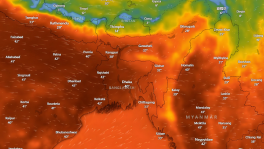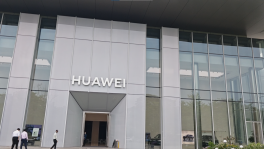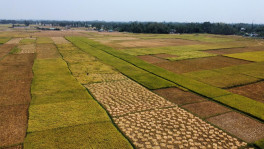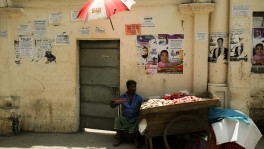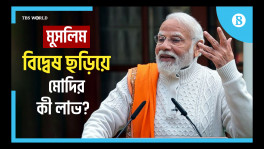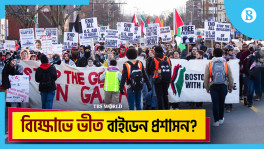Gen Zia was keen on military control in 1971, says Indian author Sukharanjan Dasgupta

Former Bangladesh President General Ziaur Rahman, founder of Bangladesh Nationalist Party (BNP), was always keen on military control of the country as he envisaged a "Pakistan-style military rule" for the country, Indian author Sukharanjan Dasgupta says in an interview with India Today.
Author and columnist Sukharanjan Dasgupta said he was briefed about Gen Zia's political ambitions by a senior BSF officer during the 1971 war. As the chief correspondent of Anandabazar Patrika, he reported on the Liberation War by gathering information from freedom fighters in Bangladesh, reports India Today.
Dasgupta is the author of "Midnight Massacre" on the 1975 Bangladesh coup that killed most members of Sheikh Mujibur Rahman's family.
"BSF troopers were fighting with freedom fighters under Zia's command from the very outset of the Pakistani crackdown on the Chittagong-Tripura border. Sometime in June 1971, he told a Bengali BSF officer that the country should be handed over to the army," Dasgupta claims.
He says then BSF IG Golak Majumder had told him about this conversation, which was kept a secret but reported.
"Desh ta Swadhin hole amader hathe deyar chestha korben. Juddho amra korchi, Neta ra sudhu bhashan dicchen (we should be allowed to run the country. The leaders are just lecturing around)," Zia allegedly had told the BSF officer whose report went up to BSF DG Nari Rustomji through Golak Majumdar, India Today reported.
The entire communication was secret but Dasgupta learnt of it from Majumder.
In 1971, Sukharanjan managed to make all his colleagues at the Anandabazar Patrika office in Kolkata donate one day's salary to wounded refugees sheltered in India, reads a story on his contributions in a leading daily in Bangladesh.
Unlike Pakistan's military rulers, the two Bangladeshi military ruler founded political parties to cement their control and ensure their legacy, India Today reported.
The role of Gen Zia in the gruesome assassination of Mujibur Rahman and his family on 15 August, 1975, has not been adequately probed and the role of several other actors in the conspiracy, including Pakistan, has not been investigated thoroughly.
Lawrence Lifschultz said that the men behind that assassination would not have moved around freely without Zia's backing. And Zia would not have been brazen enough to bring about the 'Indemnity Ordinance" that protected the killers of the country's founding father, reports India Today.
The author says that Indira Gandhi was made aware of this development that there were Bengali military officers who fancied Pakistan type army control rather than a "free flowing Indian style ballot box democracy".
"I have good reasons to believe that Indian intelligence kept Zia under surveillance after his outburst against politicians. Much as Awami League turncoat Khandkhar Mostaque was following his secret meetings with US diplomats in Calcutta," Dasgupta told India Today.
"That may explain why Sheikh Mujibur Rahman promoted Safiullah as army chief and not Zia because he may have been forewarned by Indira Gandhi," Dasgupta said.
Mostaque took charge of the post-Mujib government after the coup. His US connections, says Dasgupta, were well known to Indian spymaster P N Banerjee alias Nath Babu.
"But Banerjee told me he advised against any action on Mostaque because he was useful for disinformation to be planted on the Americans," says Dasgupta.
"The impression conveyed to Mostaque was India cannot militarily intervene in East Pakistan because it needed a large body of troops to control the Naga and Mizo insurgencies in Northeast and the Naxalite rebellion in West Bengal. This happened while India actually prepared for military action. The US was driven into complacency by the disinformation through Mostaque," Dasgupta told India Today.
P N Banerjee was later found mysteriously dead in a Dhaka hotel in late 1974 but he had conveyed the possibility of a military coup to Sheikh Mujibur Rahman several times.
Indira Gandhi personally conveyed the threat to Sheikh Mujibur Rahman, but the great leader never believed his own people could kill him and took the warnings lightly.


 Keep updated, follow The Business Standard's Google news channel
Keep updated, follow The Business Standard's Google news channel



